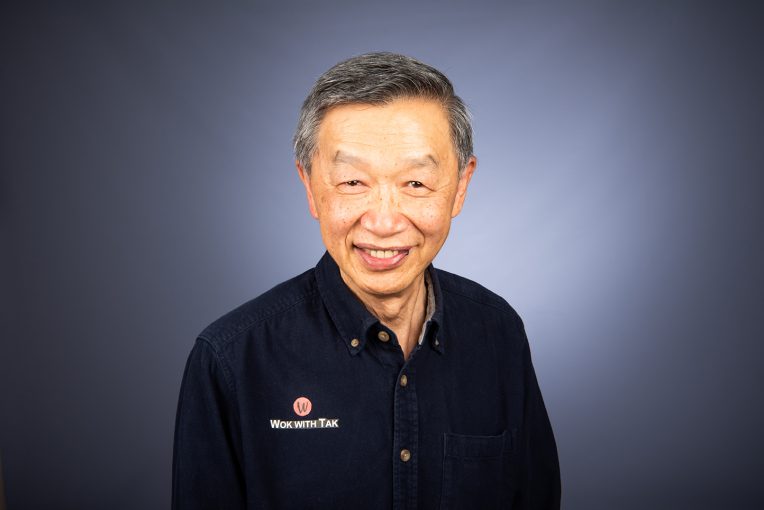Dr. Tak Cheung’s favorite time of the day revolves around the kitchen. He spends 30 minutes creating a meal with only his wok. And every day, Cheung educates his YouTube subscribers about the importance of eating healthy food that is prepared in an efficient, quick, and accessible way.
Cheung is a professor emeritus and former director of the School of Biological Sciences. He worked at Illinois State from 1979 to 2012. In retirement, he created a YouTube channel called Wok with Tak, where he shares his knowledge of his love for food and his wok cooking.
Cheung was inspired to the start the channel by his research at Illinois State on how caloric restriction extends the longevity of experimental animals, and his videos are dedicated to easy and attainable cooking lessons for those who are not experts in the kitchen. His channel grew in popularity last year.
“I started out with a couple of hundred subscribers. During the coronavirus pandemic, my viewership began to increase, so I kept doing my videos. I did a 365 project—one video for 365 days. And on my birthday in September last year, I hit 5,000 subscribers,” he said.
Cheung’s channel is now up to more than 21,000 subscribers. What makes Cheung’s videos different from other food channels is his FAST cooking system: flavor chasing, advanced prepping, stir-frying, and template-based cooking.
“The problem with society and our food relationship is we are eating more empty calories, coming mainly from processed food. After I retired, I thought about writing a book, and several of my friends said it would not be useful because people know nutrition plays a role in our health,” he said. “The most valuable thing I could do is show people how to solve this problem in a practical sense.”
Cheung’s goal is to persuade people to use his cooking method to become better cooks and enjoy what they eat.
“It’s really applicable for people who don’t have a lot of utensils. All you need is a wok, a few seasonings, and you can make anything. My videos demonstrate the flexibility of the wok, and it’ll allow you to create an entire spectrum of food, like bread, birthday cake, and spaghetti,” he said.

In his videos, Cheung emphasizes the stir-fry technique, which he demonstrates is a fast way to quick healthy food and focuses on template-based cooking in which he modifies a familiar recipe.
Exposing home cooking to children is the best gift a parent can give to their child because it is an investment in their future, he said. Cheung also wants his videos to influence young adults to eat better.
“It’ll pay off later. My former students have taken my cooking classes and switched their diets. They started to feel physically and psychologically better. I would like to see people benefit from my system,” he said.
Before Wok with Tak, Cheung admits his diet was poor. Most days he ate leftovers or take-out food with his wife, Joni St. John.
“We cooked the same dishes because we just wanted to get it done. Now we cook for flavor and variety, and it is meditative for us,” said St. John.
What is Cheung’s secret to cooking? He places flavor before the actual dish. And he does that with a combination of seasoning mixes and sauces to bring out the natural and fresh flavors of vegetables and protein in every dish.
“I always advise people that if you want to create a flavor you love, buy a masala dabba. Masala dabba is an Indian spice box, which contains seven compartments for accommodating selected herbs and spices. Because they are all available to you at once, you are more likely to experiment with what to use,” he said.
During his research at Illinois State, Cheung realized that the consumption of processed food leads to tissue inflammation which could lead to chronic diseases. Not only can reducing your calories better your health, but it can also extend your longevity.
Cheung hopes to continue to grow his YouTube following and continue influencing younger generations that they can confidently cook whatever they want without having to access a drive-thru or processed foods. Cheung shared a message to Illinois State students:
“The most important thing is to decide you can cook the best food for yourself. By having that attitude and willingness to try, explore, and fail puts you in the right direction. Make sure your time is used efficiently but also make sure you are having fun doing it. You will keep cooking for the rest of your life because you will get better. And the investment will be worth it,” he said.

